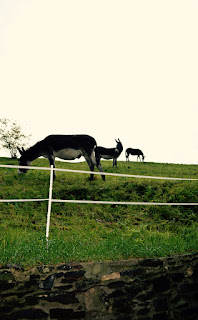…in which we note that the trainride to Gare de Comprehension is long and
contains many stops, but also great views
On Wednesday last week, le petit garçon (I AM NOT PETIT)
brought his class notebook home in his backpack. This is our conveyor of
messages about the classroom and school in general: We’re visiting a museum.
There’s been a case of lice, be on the lookout. We’re making chocolates, please
bring ingredients. The food service people will be on strike next week. (In
France perchance?) This time, class pictures have arrived! They’re ready to be
paid for and picked up.
Although I scrutinize these communiqués, I invariably miss
something. A verb tense, an innuendo, lost in the ether of translation. I’ve
already amassed a trunkload of examples. Just yesterday, our former landlady
sent me a note asking if I had by any chance taken with me the little key which
was on the trousseau. I don’t know how to translate trousseau, but I thought, aha! I can sleuth my way through this. If
trousseau in English means a woman’s possessions, often mostly clothes, which
accompanies her into marriage, then maybe in French “trousseau” means something
in which one puts one’s clothes and other belongings, like a chest of drawers.
I rack my brain to think about what piece of furniture in her house might fit
the bill but can’t think of it, so I write back asking which trousseau might
she be referring to—the one in the hallway? I ask The Frenchman who casually says
“the trousseau of keys”—as in trousseau
de clés—and it turns out it’s a little old keyring. Apparently, trousser means ‘to truss’, or perhaps to
‘bundle’, as a bride might bundle up the items in her trousseau—or I might bundle
my bloody keys together. Sheesh.
Excited and a little apprehensive, I put my money in an
envelope and write, in my best handwriting and my good blue brush pen: Luca Brancourt. 17 euros. We decide to
get the full package, though I’ve no idea really what this means. Is it a page
of 2x3 wallet-size photos? What does “wallet-size” mean here? What is this word
that maybe means siblings? How much time do we have to get this done? Will they
think me pathetically overeager if I turn up the very next day with my money?
I realize that these small anxieties arise, and pile up, so
frequently I hardly even notice.
We arrive to school, to the usual bustle of hurried
parents, jackets and scarves, dawdling children, final bisous. I hold my
envelope of money in both hands, wondering what to do next, some kind of unsure
and obedient student again. A stack of picture packages waits expectantly on
the desks. Apparently we have all chosen the 17-euro option, and I say a brief
prayer of thanks that I have made the Right Decision, I am flowing with the
group somewhat. With my eyes closed I staggered forward, grasping my donkey’s
tail which I then pinned willy-nilly on the first wall I bumped into, and this
time I got it kinda close to the ass. Success!
The maîtresse sits, noting who’s paid and moneys collected.
She seems a bit discombulated, fielding questions and taking cash from hovering
parents crowded around the desk. I see several with twenty euro bills and
think, I have an envelope of change, maybe I can assist here! Only I’m not sure
about the word for change. Monnaie? Change?
No, that sounds silly. Stupid. Argh, silly stupid simple sentence. Here—I have some change. Jeezus, Una. I
lean in a little, clear my throat, say Here,
here, but it’s like there’s an ocean between me and this person two feet
away across the table. Am I speaking that softly? J’ai, j’ai… I’m hoping someone else will finish my sentence. What
is with this today? What an idiot I must appear, fumbling around with the
simplest of words.
Finally—after what seems like hours with me standing there
waving my envelope in the crowd—she takes my money, sees that there is change
here! … and notes that le petit garçon has picked up his pictures.
I have already been thinking about what to say once I pay.
I’m ready with “Je peux prendre?” and before I get the chance she says Prenez, gesturing to the pile of
pictures. My mind turns it over and I think Yes, OK, she’s saying take, but
with vous, conjugating prendre. Five
stops along the way before we reach our station of comprehension, and another
three at least before I can summon my response and the courage to express it
aloud.
During this whole worrying swirl, I notice a child sitting
next to me, looking over the class picture with his mother. Indifferent to the
activity around him, he busily scans each of the four rows of students looking
earnestly out at us, and names each one.
Magdalena Manon Ahmed Aylan Daphné Harold Gaspar Violette Lubna Lucas
avec S Aurélien Zeli . . .
He’s got momentum, and I can sense his pride in being able
to name them with such speed. The mother beams too, and I am grinning idiotically,
looking forward to le petit garçon doing the same when we get home. He watches
on, impressed by his friend’s skill.
I’ll take this moment of grace amidst the chaos. The occasional
pause, to just stand and look around, with wonder. Watching, breathing, present
in the lost-ness. The clouds shift and the weather clears a little. I’ll take
it.






